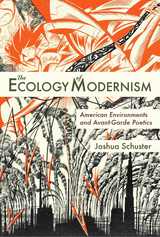2 books about American Environments

The Ecology of Modernism
American Environments and Avant-Garde Poetics
Joshua Schuster
University of Alabama Press, 2015
In The Ecology of Modernism, Joshua Schuster examines the relationships of key modernist writers, poets, and musicians to nature, industrial development, and pollution. He posits that the curious failure of modernist poets to develop an environmental ethic was a deliberate choice and not an inadvertent omission.
In his opening passage, Schuster boldly invokes lines from Walt Whitman’s “Crossing Brooklyn Ferry,” which echo as a paean to pollution: “Burn high your fires, foundry chimneys! cast black shadows at nightfall!” Schuster labels this theme “regeneration through pollution” and demonstrates how this motif recurs in modernist compositions. This tolerance for, if not actual exultation of, the by-products of industrialization hindered modernist American artists, writers, and musicians from embracing environmentalist agendas.
Schuster provides specific case studies focusing on Marianne Moore and her connection of fables with animal rights; Gertrude Stein and concepts of nature in her avant-garde poetics; early blues music and poetry and the issue of how environmental disasters (floods, droughts, pestilence) affected black farmers and artists in the American South; and John Cage, who extends the modernist avant-garde project formally but critiques it at the same time for failing to engage with ecology. A fascinating afterword about the role of oil in modernist literary production rounds out this work.
Schuster masterfully shines a light on the modernist interval between the writings of bucolic and nature-extolling Romantics and the emergence of a self-conscious green movement in the 1960s. This rewarding work shows that the reticence of modernist poets in the face of resource depletion, pollution, animal rights, and other ecological traumas is highly significant.
In his opening passage, Schuster boldly invokes lines from Walt Whitman’s “Crossing Brooklyn Ferry,” which echo as a paean to pollution: “Burn high your fires, foundry chimneys! cast black shadows at nightfall!” Schuster labels this theme “regeneration through pollution” and demonstrates how this motif recurs in modernist compositions. This tolerance for, if not actual exultation of, the by-products of industrialization hindered modernist American artists, writers, and musicians from embracing environmentalist agendas.
Schuster provides specific case studies focusing on Marianne Moore and her connection of fables with animal rights; Gertrude Stein and concepts of nature in her avant-garde poetics; early blues music and poetry and the issue of how environmental disasters (floods, droughts, pestilence) affected black farmers and artists in the American South; and John Cage, who extends the modernist avant-garde project formally but critiques it at the same time for failing to engage with ecology. A fascinating afterword about the role of oil in modernist literary production rounds out this work.
Schuster masterfully shines a light on the modernist interval between the writings of bucolic and nature-extolling Romantics and the emergence of a self-conscious green movement in the 1960s. This rewarding work shows that the reticence of modernist poets in the face of resource depletion, pollution, animal rights, and other ecological traumas is highly significant.
[more]

Erosion
American Environments and the Anxiety of Disappearance
Gina Caison
Duke University Press, 2024
In Erosion, Gina Caison traces how American authors and photographers have grappled with soil erosion as a material reality that shapes narratives of identity, belonging, and environment. Examining canonical American texts and photography including The Grapes of Wrath, Octavia Butler’s Parable series, John Audubon’s Louisiana writings, and Dorothea Lange’s Migrant Mother, Caison shows how concerns over erosion reveal anxieties of disappearance that are based in the legacies of settler colonialism. Soil loss not only occupies a complex metaphorical place in the narrative of American identity; it becomes central to preserving the white settler-colonial state through Indigenous dispossession and erasure. At the same time, Caison examines how Indigenous texts and art, such as Lynn Riggs's play Green Grow the Lilacs, Karenne Wood’s poetry, and the photography of Monique Verdin, challenge colonial narratives of the continent by outlining the material stakes of soil loss for their own communities. From California to Oklahoma to North Carolina’s Outer Banks, Caison ultimately demonstrates that concerns over erosion reverberate out into issues of climate change, land ownership, Indigenous sovereignty, race, and cultural and national identity.
[more]
READERS
Browse our collection.
PUBLISHERS
See BiblioVault's publisher services.
STUDENT SERVICES
Files for college accessibility offices.
UChicago Accessibility Resources
home | accessibility | search | about | contact us
BiblioVault ® 2001 - 2024
The University of Chicago Press









